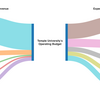Temple Budget Overview
Temple University’s operating budget is primarily driven by tuition revenue and supports key functions such as academic departments, student services, libraries, campus operations, and administration. The RCM model is used to facilitate the allocation of funds across various units. Around 65% to 70% of Temple's $1.2 billion budget is dedicated to compensation and benefits, reflecting Temple’s investment in its faculty and staff.



